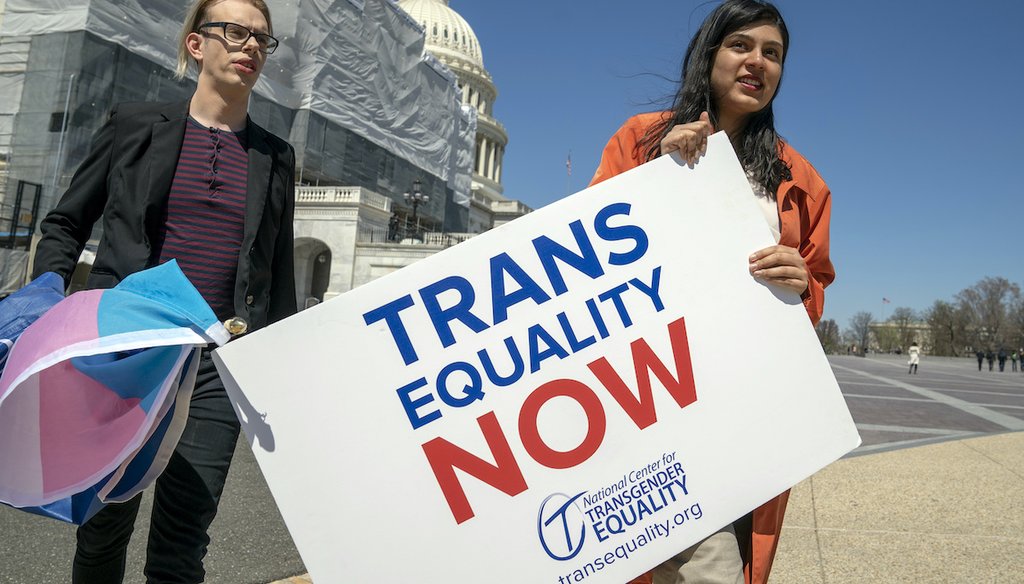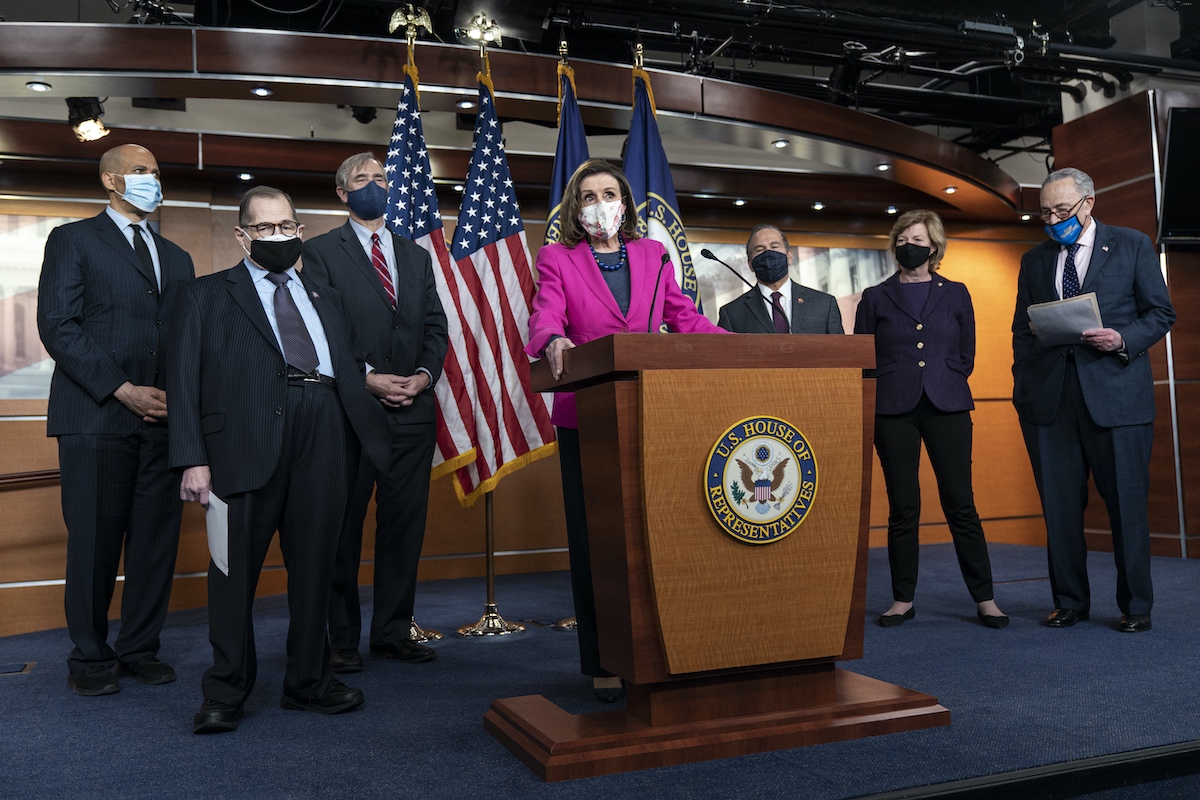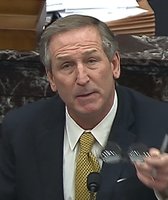Stand up for the facts!
Our only agenda is to publish the truth so you can be an informed participant in democracy.
We need your help.
I would like to contribute

Ketaki Deo, right, and Charlie Whittington, students at George Washington University, arrive for an event supporting The Equality Act, a comprehensive nondiscrimination bill for LGBT rights, on Capitol Hill in Washington on April 1, 2019. (AP)
If Your Time is short
-
Some lawmakers have pushed back on an anti-LGBTQ discrimination bill by saying that there are only two genders: male and female.
-
Scientists, public health agencies and biologists say gender identity goes beyond male and female. The CDC says gender refers to “the cultural roles, behaviors, activities, and attributes expected of people based on their sex.”
-
Sex, which is different from gender, refers to “the different biological and physiological characteristics of females, males and intersex persons,” according to the WHO. There are more outcomes than simply male and female.
On one side of the Capitol Hill hallway is a pink and blue flag, a symbol for transgender pride. Directly across is a sign that says: "There are TWO genders: male & female. ‘Trust the science!’"
"Thought we’d put up our transgender flag so she can look at it every time she opens her door," tweeted Rep. Marie Newman, D-Ill., who has a transgender daughter.
"Thought we’d put up ours so she can look at it every time she opens her door," tweeted Rep. Marjorie Taylor Greene, R-Ga.
Their dispute is a microcosm of a larger debate over the Equality Act, a Democratic proposal to prohibit discrimination based on sexual orientation and gender identity. Newman supports the bill; Greene opposes it.
Supporters say the Equality Act provides overdue anti-discrimination protections for LGBTQ Americans who in many states can be denied housing and access to other services based on their identity. Some opponents say that the proposal infringes on the rights of faith-based organizations.
Sign up for PolitiFact texts
Much of the political debate has centered on gender identity — particularly Greene’s notion that there are "two genders." However, public health agencies, doctors and biologists say science is clear: Gender identity goes beyond male and female.
"Sex is a biological term, gender is a social construct," said Ignacio T. Moore, a biological sciences professor at Virginia Tech. "In other words, gender can vary with society and culture."
The belief that there are only two genders is an oversimplification, "and what science really tells us is that it is more complicated," said Dr. Jason Rafferty, a clinical assistant professor at Brown University.
What’s in the Equality Act?
The Equality Act, which passed the House largely along party lines, would amend the 1964 Civil Rights Act by prohibiting discrimination on the basis of sex, sexual orientation and gender identity.
The Equality Act would supersede the 1993 Religious Freedom Restoration Act, a law intended to protect religious practices from government interference. (The U.S. Supreme Court decided in 1997 that the federal law did not apply to states, prompting some states to pass their own version of the law.)
If the Equality Act became law, private businesses that are open to the public — including retail stores such as bakeries and flower shops — would not be permitted to deny service to LGBTQ people by claiming it violates their religious beliefs. The bill applies to employment, education, housing, credit, jury service, public accommodations, and programs that receive federal funding.
Senate Majority Leader Chuck Schumer, D-N.Y., said he would bring the legislation to a vote on the Senate floor, and President Joe Biden promised to sign the Equality Act.
House Speaker Nancy Pelosi, center, speaks about the Equality Act on Feb. 25, 2021, with Rep. Jerry Nadler, D-N.Y., and other lawmakers on Capitol Hill in Washington. (AP)
Scientists say there aren’t only two genders
The Centers for Disease Control and Prevention has a list of terminology associated with sex and gender, acknowledging that terms and definitions "may change over time."
Gender refers to "the cultural roles, behaviors, activities, and attributes expected of people based on their sex," according to the CDC. Gender is not assigned at birth — it derives its meaning from the society in which one lives.
"Human nature is diverse in many ways that goes beyond simply biological and anatomical differences between people, and we are coming to understand that gender is such a characteristic that can be both complicated and personal," Rafferty said. "A person’s gender identity may be masculine, feminine, a combination of both or neither, or it may shift over time."
Cisgender is the term used to describe someone whose gender aligns with the sex they were assigned at birth, such as biological males who identify as men. There are numerous other ways for people to describe their gender identity, including nonbinary (individuals who identify as neither a man nor a woman) and transgender (individuals whose gender differs from the sex they were assigned at birth).
A February Gallup poll found that 5.6% of U.S. adults identify as LGBTQ, and 0.6% identify specifically as transgender. Gallup noted that those numbers could underestimate the actual population, as older adults may be less likely to self-identify as LGBTQ.
Sexual orientation is often conflated with gender identity and sex, said Karen Parker, director of the Sexual & Gender Minority Research Office at the National Institutes of Health. But all three categories are distinct, and sexual orientation primarily "relates to identity attraction and behavior," she said.
Sex is not the same as gender
The World Health Organization says sex refers to "the different biological and physiological characteristics of females, males and intersex persons, such as chromosomes, hormones and reproductive organs."
One might think that sex is a trait with only two biological possibilities. But medical research and firsthand accounts indicate that strictly male and female sex characteristics are not the only outcomes.
The biological sex of humans is partially determined by the configuration of chromosomes, the long strands of DNA that contain the genetic information of an organism. If you’re born with two X chromosomes, your biological sex will most likely be female. Biological males typically have one X and one Y chromosome.
In this June 6, 2019, photo, Victory, an intersex girl, points to her baby photo, as her brother Richard and her mother Amie Schofield look on, at their home in Ogden, Utah. (AP)
Sometimes, there’s a discrepancy between someone’s sex assigned at birth and their biological, physiological or physical characteristics. Intersex is a term that’s used to describe any variation in sex characteristics, which can sometimes be related to chromosomes and hormones.
Moore offered some examples that could result in someone being intersex:
-
People with Y chromosomes that lack a specific gene can develop and identify as females.
-
People with testes that do not descend into the scrotum can develop and identify as females.
-
People with testosterone levels typical of a biological male but who lack the receptor for the hormone can develop and identify as female.
"With these factors in mind," Moore said. "I think it becomes clear that an individual’s sex is not necessarily binary, as factors can conflict."
Estimates for the proportion of babies who are born intersex range from 0.018% to 1.7%, depending on how intersex is defined.
Nature provides variations in sex and humans decide how to categorize them, said Alice Dreger, a bioethicist who has researched differences of sex development. "Nature doesn’t tell us who counts as male, who counts as female and who counts as intersex — we draw those lines," she said.
A misunderstanding of gender identity and sex deserves clarification, experts said, because LGBTQ Americans — particularly youth — face more adverse health outcomes than other Americans.
"The big thing to remember is that it’s not just politics," Rafferty said. "These are people’s lives."
RELATED: Rachel Levine does not support gender confirmation surgery for all children
Our Sources
Alice Dreger, "Hermaphrodites and the Medical Invention of Sex"
American Journal of Human Biology, "How sexually dimorphic are we? Review and synthesis," Feb. 11, 2000
Anne Fausto-Sterling, "Sexing the Body: Gender Politics and the Construction of Sexuality"
Centers for Disease Control and Prevention, Adolescent and School Health: Terminology
Congress.gov, H.R.1308 - Religious Freedom Restoration Act of 1993
Congress.gov, H.R.5 - Equality Act
Cureus, "Health Care Disparities Among Lesbian, Gay, Bisexual, and Transgender Youth: A Literature Review," April 2017
Email interview with Dr. Jason Rafferty, clinical assistant professor at Brown University, March 2, 2021
Gallup, "LGBT Identification Rises to 5.6% in Latest U.S. Estimate," Feb. 24, 2021
Healthline, "64 Terms That Describe Gender Identity and Expression"
Human Rights Campaign, 2020 State Equality Index
Intersex Human Rights Australia, "Intersex population figures," Sept. 28, 2013
Interview with Alice Dreger, bioethicist and differences of sex development researcher, March 2, 2021
Interview with David Sloan Wilson, an evolutionary biologist and emeritus professor at Binghamton University, March 1, 2021
Interview with Karen Parker, director of the Sexual & Gender Minority Research Office at the National Institutes of Health, March 2, 2021
Email interview, Ignacio T. Moore, a biological sciences professor at Virginia Tech, March 2, 2021
The Journal of Sex Research, "How common is lntersex? A response to Anne Fausto‐Sterling," Feb. 5, 2002
Letter from the United States Conference of Catholic Bishops, Feb. 23, 2021
Mayo Clinic, Congenital adrenal hyperplasia
Mayo Clinic, Klinefelter syndrome
Mayo Clinic, Turner syndrome
MedlinePlus, Intersex
National Human Genome Research Institute, "The Y chromosome: beyond gender determination"
National Institute of Child Health and Human Development, "What are the symptoms of congenital adrenal hyperplasia (CAH)?"
PolitiFact, Biden Promise Tracker: Enact the Equality Act
Quartz, "An intersex shark discovered near Taiwan shines a light on fluidity in the animal kingdom," Dec. 27, 2017
Rev, Pelosi, Schumer Press Conference on House Equality Act Transcript February 25
Teen Vogue, "9 Young People on How They Found Out They Are Intersex," Oct. 25, 2019
Tweet from Rep. Marie Newman, Feb. 24, 2021
Tweet from Rep. Marjorie Taylor Greene, Feb. 24, 2021
United Nations Free & Equal, FACT SHEET: Intersex
U.S. House of Representatives Clerk, Roll Call 39 | Bill Number: H. R. 5
World Health Organization, Gender and Genetics
World Health Organization, Gender and health





































